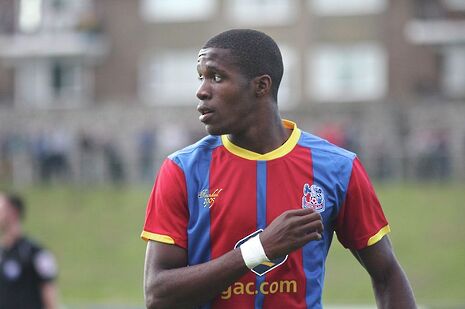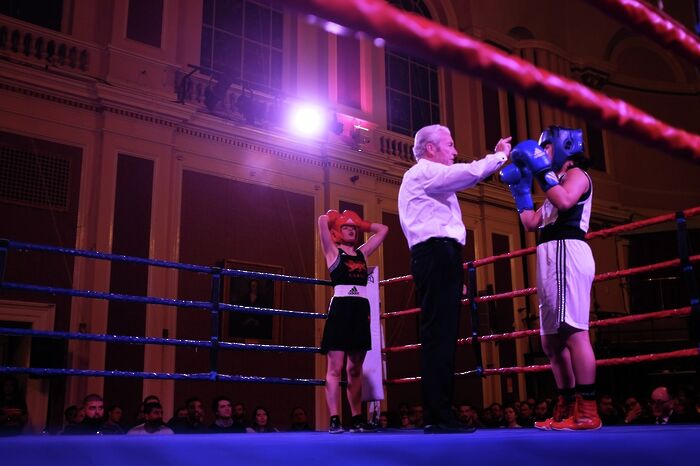Why Wilfried Zaha has every right to see red
Frey Lewis argues that we need to acknowledge and challenge the toxic culture entrenched in football

I have never enjoyed seeing football players sent off, particularly when I believe the perpetrator is innocent and the flash of red uncalled for, as was the case for young black winger Wilfried Zaha. During a game against Premier League rivals, Southampton, Zaha received two successive yellow cards for improper conduct – first for aggression and then for sarcastically clapping the referee’s decision. He was subsequently sent off, the jeering of rival fans following him down the tunnel. In itself, this is fairly ordinary: a player loses his temper and is duly punished; however, for a while I have been sensing more disturbing undercurrents in the way Zaha has been treated. Deciphering these undercurrents involves delving into the toxic culture that is entrenched in football - a culture of performative masculinity and intrinsic racism, which young black players often bear the brunt of.
“How badly does Zaha need to be treated before those with a platform stop pathologizing the problem and blaming the victim?”
Despite being someone who comes from a football-obsessed family and has followed the game all their lives, I cannot help but be hesitant to truly immerse myself into the culture which surrounds it. On one hand, I would never not be an (albeit long-suffering!) Crystal Palace fan: the sense of community and belonging that is fostered by the shared emotional turbulence of supporting your team is unparalleled. However, the very things that make football culture such a positive thing also tarnish it. The intensely collective mentality of supporters often seems to manifest itself in unhealthy ways, specifically in aggressive rivalries and the virulent abuse of ‘rival’ players.
As his career has progressed, Wilfried Zaha has been a particular victim of this. He has been labelled with a plethora of offensive and unfair charges: being a cheat, a diver and having an attitude problem are all characteristics that a concerningly augmenting number have attributed to him. He is clearly targeted by opposition fans, who boo when he so much as touches the ball, and Watford ‘legend’ Troy Deeney admitted that players ‘take turns in kicking him’ on BBC Radio Five Live. Zaha has shared some of the awful abuse he receives via social media, which includes racial slurs and wishes of injury and death upon him.
The racial abuse makes explicit another dimension to what Zaha faces. Too often, we see young black players like Zaha (Sterling and Pogba are more high profile examples) disparaged by the footballing world for their ‘attitude’ or their personal lives. Negative stereotypes of black men, and what seems to be fear of them prospering in football, lies at the root of the criticism Zaha faces.
In the case of Wilfried Zaha, tensions have spiralled on two occasions already this season: he claimed he would need to have his ‘leg broken’ for someone to be punished for fouling him, after a horror tackle by Etienne Capoue, and his recent dismissal against Southampton. The circumstances surrounding both these incidents aside, what bothers me in particular is the reaction of those in the profession – namely football pundits. In the wake of these incidents, Zaha has been told to ‘grow up’, called ‘idiotic’ for reacting to abuse, and advised to take being targeted as ‘a sign of respect’. This is irresponsible at best and downright dangerous at worse. By saying that Zaha should keep quiet and soldier on, football pundits are peddling ideals of toxic and performative masculinity. Why should Zaha take abuse and aggression as a ‘compliment’?
In an age where we are rightly trying to raise awareness and sensitivity around men’s mental health, surely we should be considering the emotional and psychological toll perpetual abuse has on young players, instead of essentially reverting back to the motif of ‘man up’. ‘But Hazard gets exactly the same thing and doesn’t complain!’, I hear white, middle-aged football pundits cry from the television screen. Yes, Hazard does get fouled and should be protected by referees, but the abuse he gets is nowhere near the personalised vitriol players like Zaha face on a daily basis. Ignoring the racial dimension of Zaha’s abuse is wilful ignorance.
But, of course, it takes something glaringly obvious for racism in football to be taken seriously. It smacks of hypocrisy when pundits condemn a banana being thrown at Aubameyang, and Sterling being called a ‘black ****’, yet continue to justify the abuse Zaha gets. It worries me as I wonder: how far do things need to go? How badly does Zaha need to be treated before those with a platform stop pathologizing the problem and blaming the victim?
At the end of the day, football players are people and deserve compassion – no matter how good at dribbling they are. My hope is that this should transcend all the rivalries and hypermasculine masquerades that continue to permeate football culture,. but we are not yet at that point, and young black players like Zaha continue to bear that burden for us all. While he does, I will not condemn him for lashing out at those who target him; he has every right to be seeing red.
 Features / Should I stay or should I go? Cambridge students and alumni reflect on how their memories stay with them15 December 2025
Features / Should I stay or should I go? Cambridge students and alumni reflect on how their memories stay with them15 December 2025 News / Cambridge study finds students learn better with notes than AI13 December 2025
News / Cambridge study finds students learn better with notes than AI13 December 2025 News / Dons warn PM about Vet School closure16 December 2025
News / Dons warn PM about Vet School closure16 December 2025 Comment / The magic of an eight-week term15 December 2025
Comment / The magic of an eight-week term15 December 2025 News / News In Brief: Michaelmas marriages, monogamous mammals, and messaging manipulation15 December 2025
News / News In Brief: Michaelmas marriages, monogamous mammals, and messaging manipulation15 December 2025









